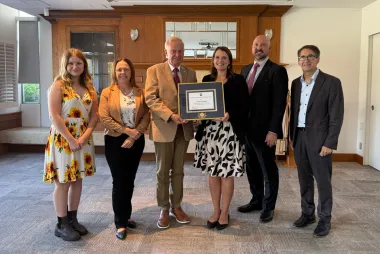Interdisciplinary UBC Engineering research tackles healthy aging

Two interdisciplinary research projects involving UBC Engineering researchers are each receiving up to $25,000 in Health Innovation Funding Investment (HIFI) Awards from UBC Health to address pressing health challenges.
Engineering experts in UBC Vancouver's School of Biomedical Engineering and the UBC Okanagan School of Engineering are tackling challenges associated with aging, including understanding the use of health resources among older adults at increased risk of falls, as well as identifying microbes in age-related dry eye diseases.
HIFI Awards enable interdisciplinary health research teams to undertake innovative activities with the potential to create change, enabling cross-faculty and cross-campus collaborations across UBC Vancouver and Okanagan. A new healthy aging stream in partnership with the Edwin S.H. Leong Centre for Healthy Aging is also supporting interdisciplinary approaches involving engineering to address health challenges related to aging.
A total of 10 interdisciplinary research teams were selected across UBC to receive HIFI Awards (full list of recipients).
HIFI recipients affiliated with UBC Engineering
Healthy aging stream
A patient-oriented and case-mix approach to understand drivers of health resource utilization among older adults at high risk of falls
HIFI Award: $25,000
This study will identify case-mixes of patients who have different cost trajectories (i.e., high, declining, increasing, etc.) to ascertain modifiable clinical factors that predict these trajectories. The interdisciplinary cross-campus research team will integrate patient experiences from its falls prevention patient partners to develop patient recommendations for targeting the modifiable factors.
- Ryan Falck, Postdoctoral Fellow, School of Biomedical Engineering
Identification of a conjunctival-gut microbiome axis in age-related dry eye diseases
HIFI Award: $25,000
This research collaboration will: 1) develop novel protocols for the isolation and detection of conjunctival microbiome; and 2) produce pilot data on conjunctival-gut microbiome axis in age-related dry eye diseases. The pilot data will be used to support a Canadian Institutes of Health Research grant application on using ocular microbiome as a biomarker of dry eye diseases in the aging population to improve diagnosis and treatment strategies.
- Sepideh Pakpour, Assistant Professor, UBC Okanagan School of Engineering
- Javad Sadeghi, Postdoctoral Fellow, UBC Okanagan School of Engineering
- Michael Zhao, Undergraduate Research Assistant, UBC Okanagan School of Engineering


